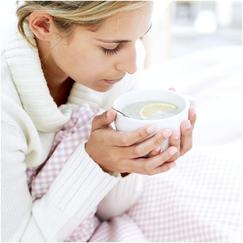
It's late at night. You're starting to get sick and there's no medicine in the house. What do you do?
Your remedy could already be in your fridge, cupboard or bathroom. Most over-the-counter cold medications simply suppress symptoms but don't do anything to actually help your immune system. Suppressing symptoms can actually increase the duration of your cold. In addition these medications are often loaded with dyes and additives such as, D&C Yellow No. 10, FD&C Green No. 3, FD&C Yellow No. 6, Flavor, High Fructose Corn Syrup, Polyethylene Glycol, Propylene Glycol (the main ingredient in anti-freeze!).
These following remedies are very effective, easy to find and inexpensive.
Garlic - This aromatic member of the onion family contains almost 80 sulfur compounds. These sulfur compounds are similar to those found in sulfur based antibiotics. Allicin is the sulfur compound that gives garlic it's distinctive odor. Not only does garlic help fight viruses, bacteria and fungus it also helps to lower "bad" cholesterol and has been shown to reduce the risk of certain types of cancer. In order for these compounds to be activated the garlic must be cut or crushed.
Lemon - Naturally high in vitamin C, lemon juice has been used as a cold remedy for thousands of years. Lemon juice's astringent properties helps to thin mucous and constrict blood vessels in the throat, ultimately reducing inflammation. It's acidic properties make the upper respiratory environment inhospitable for viruses.
Honey - This sweet nectar made by bees has many medicinal properties. It's anti-microbial properties are so well documented that it is often used topically in wound healing. Honey is also a natural anti-tussive (stops a cough). It's thick consistency helps to coat and soothe a raw, irritated throat.
Hot tea - The heat alone from a hot cup of tea can help to clear mucous and kill bacteria. Adding lemon and honey will increase the healing property of hot tea. Most hot teas are helpful, but for added immune support choose teas that include licorice, wild cherry bark, echinacea and eucalyptus, among others.
Vinegar - This is an excellent remedy for thinning mucous. It's also acidic and has the same astringent properties as lemon juice. Mixing 1 Tblsp honey with 1 Tblsp vinegar can knock out a cough immediately. If this mixture is too strong it can be mixed with 1-2 Tblsp hot water. Try not to follow this remedy with any other fluids to allow the mixture to coat the throat and do it's job where it's needed.
Throat compress - Hydrotherapy is a healing modality that is helpful for many conditions. In general, it helps to move blood and relieve congestion, as well as bring healing white blood cells to the area. A simple throat compress consists of wrapping the throat with cotton cloth that has been dipped in ice cold water and thoroughly wrung out. Cover the cold cloth with a wool scarf or thick wool flannel. This should be left on all night long.
Salt water - Pain from a sore throat and nasal congestion is often caused by inflammation within the mucous membrane. One of the best ways to reduce this inflammation is to pass water over the mucous membrane that contains salt in a concentration that is saltier than your body. This kind of solution is called hypertonic. Using a hypertonic salt solution via nasal lavage or as a throat gargle can greatly reduce pain and inflammation by pulling water from the mucous membranes via osmosis. In addition, it will create an environment that is inhospitable to viruses and bacteria.
Warming sock treatment - This is another hydrotherapy treatment that helps to move blood and redirect circulation. A warming sock treatment moves blood and congestion from the head and chest to the feet. It's that simple. It's great for relieving symptoms and improving sleep.
Water - Nature's most powerful mucolytic (breaks up mucous) is water. Mucous that is dry and dehydrated gets stuck and creates an environment that is uncomfortable as well as favorable to bacteria. Hydrating by drinking lots of hot tea is best when fighting a cold.
Rest - This is the most important thing your body needs above all other remedies. When we get sick we start to feel run down and tired. It's important to listen to your body and give it what it needs. Getting the sleep your body needs actually increases white blood cell production and allows your body to rest and focus on healing. You will most likely need more sleep than usual when your sick or getting sick. Allow plenty of time for going to bed early and sleeping in when possible.
Incorporating several or all of these remedies in your arsenal of cold and flu treatments will help to support your body's healing process and not suppress symptoms in an unhealthy way. If your symptoms continue to worsen and you develop a fever, severe sore throat, swollen lymph glands or body aches and fatigue you may need to be seen by a healthcare practitioner.
Your remedy could already be in your fridge, cupboard or bathroom. Most over-the-counter cold medications simply suppress symptoms but don't do anything to actually help your immune system. Suppressing symptoms can actually increase the duration of your cold. In addition these medications are often loaded with dyes and additives such as, D&C Yellow No. 10, FD&C Green No. 3, FD&C Yellow No. 6, Flavor, High Fructose Corn Syrup, Polyethylene Glycol, Propylene Glycol (the main ingredient in anti-freeze!).
These following remedies are very effective, easy to find and inexpensive.
Garlic - This aromatic member of the onion family contains almost 80 sulfur compounds. These sulfur compounds are similar to those found in sulfur based antibiotics. Allicin is the sulfur compound that gives garlic it's distinctive odor. Not only does garlic help fight viruses, bacteria and fungus it also helps to lower "bad" cholesterol and has been shown to reduce the risk of certain types of cancer. In order for these compounds to be activated the garlic must be cut or crushed.
Lemon - Naturally high in vitamin C, lemon juice has been used as a cold remedy for thousands of years. Lemon juice's astringent properties helps to thin mucous and constrict blood vessels in the throat, ultimately reducing inflammation. It's acidic properties make the upper respiratory environment inhospitable for viruses.
Honey - This sweet nectar made by bees has many medicinal properties. It's anti-microbial properties are so well documented that it is often used topically in wound healing. Honey is also a natural anti-tussive (stops a cough). It's thick consistency helps to coat and soothe a raw, irritated throat.
Hot tea - The heat alone from a hot cup of tea can help to clear mucous and kill bacteria. Adding lemon and honey will increase the healing property of hot tea. Most hot teas are helpful, but for added immune support choose teas that include licorice, wild cherry bark, echinacea and eucalyptus, among others.
Vinegar - This is an excellent remedy for thinning mucous. It's also acidic and has the same astringent properties as lemon juice. Mixing 1 Tblsp honey with 1 Tblsp vinegar can knock out a cough immediately. If this mixture is too strong it can be mixed with 1-2 Tblsp hot water. Try not to follow this remedy with any other fluids to allow the mixture to coat the throat and do it's job where it's needed.
Throat compress - Hydrotherapy is a healing modality that is helpful for many conditions. In general, it helps to move blood and relieve congestion, as well as bring healing white blood cells to the area. A simple throat compress consists of wrapping the throat with cotton cloth that has been dipped in ice cold water and thoroughly wrung out. Cover the cold cloth with a wool scarf or thick wool flannel. This should be left on all night long.
Salt water - Pain from a sore throat and nasal congestion is often caused by inflammation within the mucous membrane. One of the best ways to reduce this inflammation is to pass water over the mucous membrane that contains salt in a concentration that is saltier than your body. This kind of solution is called hypertonic. Using a hypertonic salt solution via nasal lavage or as a throat gargle can greatly reduce pain and inflammation by pulling water from the mucous membranes via osmosis. In addition, it will create an environment that is inhospitable to viruses and bacteria.
Warming sock treatment - This is another hydrotherapy treatment that helps to move blood and redirect circulation. A warming sock treatment moves blood and congestion from the head and chest to the feet. It's that simple. It's great for relieving symptoms and improving sleep.
Water - Nature's most powerful mucolytic (breaks up mucous) is water. Mucous that is dry and dehydrated gets stuck and creates an environment that is uncomfortable as well as favorable to bacteria. Hydrating by drinking lots of hot tea is best when fighting a cold.
Rest - This is the most important thing your body needs above all other remedies. When we get sick we start to feel run down and tired. It's important to listen to your body and give it what it needs. Getting the sleep your body needs actually increases white blood cell production and allows your body to rest and focus on healing. You will most likely need more sleep than usual when your sick or getting sick. Allow plenty of time for going to bed early and sleeping in when possible.
Incorporating several or all of these remedies in your arsenal of cold and flu treatments will help to support your body's healing process and not suppress symptoms in an unhealthy way. If your symptoms continue to worsen and you develop a fever, severe sore throat, swollen lymph glands or body aches and fatigue you may need to be seen by a healthcare practitioner.

 RSS Feed
RSS Feed
